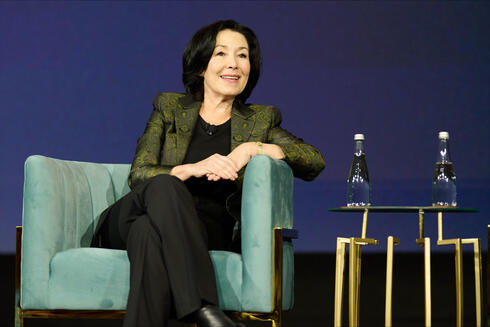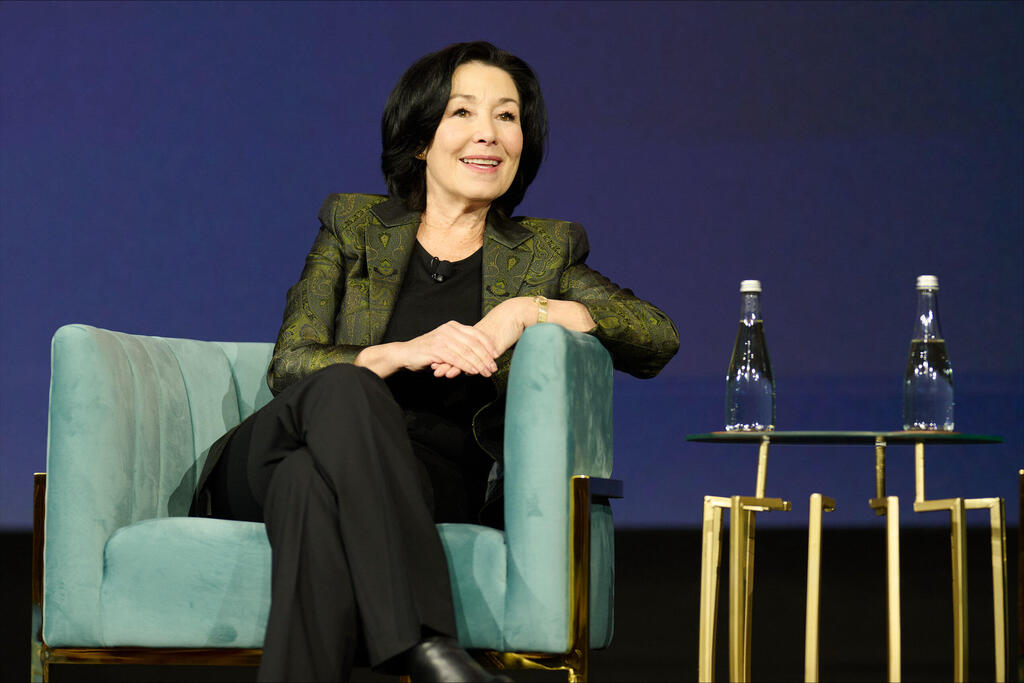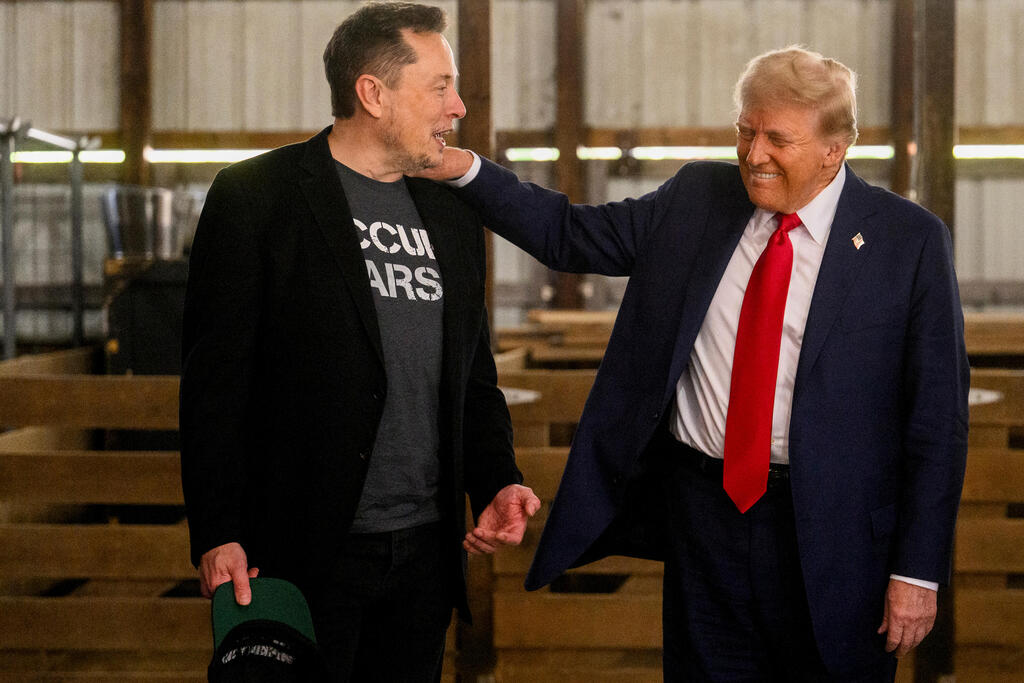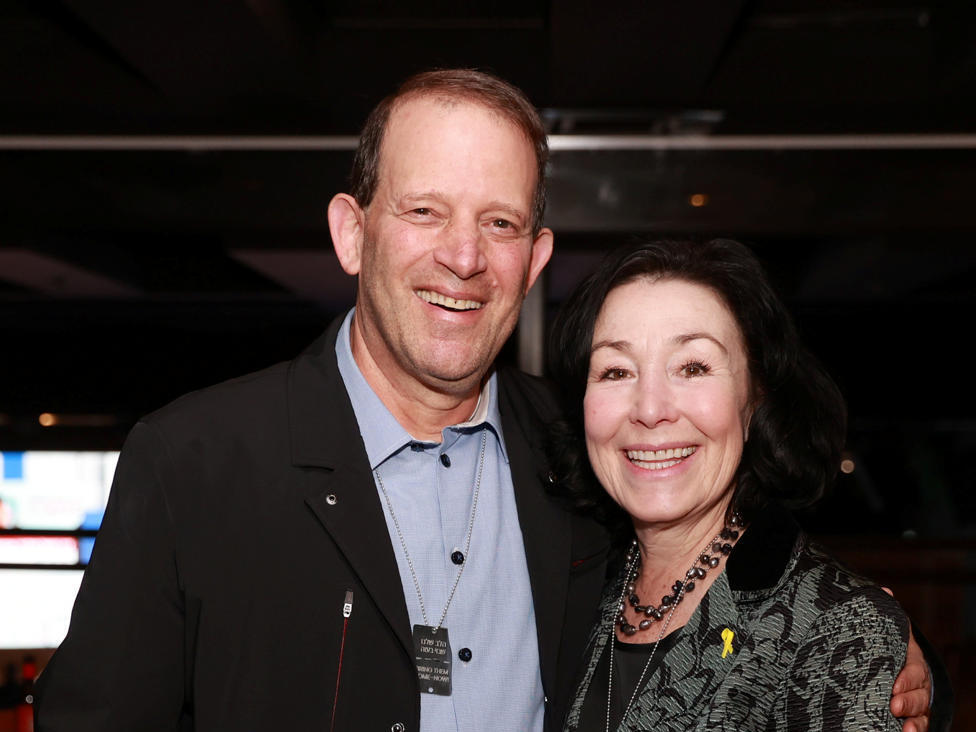
Oracle CEO: "If we continue on our current trajectory, reaching a valuation of a trillion dollars is inevitable"
Oracle is doubling down on cloud infrastructure and AI to propel its growth, with an eye on becoming a trillion-dollar company. CEO Safra Catz reveals in an interview how the company’s aggressive investments and strategic expansions are poised to accelerate its financial ascent and why she’s convinced Israel will be flooded with investments after the war.
"I talk to investors, and everyone knows that Israel is still the Startup Nation," says Safra Catz, CEO of software giant Oracle. "They want to return to investing here; they just need stability. I see that Israelis are tired, but I believe we are nearing the end of the war, and everything will recover. The country will be flooded with investments, literally. Israel is stronger today than in any previous war."
Catz, 62, is one of the most powerful and admired executives in the world. She has worked at Oracle for 25 years, and a decade ago, founder and chairman Larry Ellison—who also serves as the company’s Chief Technology Officer—appointed her CEO. Today, she is the highest-paid woman on Wall Street, with a personal net worth estimated at $2.2 billion.
Although she left Israel for the United States at age six, Catz has maintained a strong connection to her homeland. The interview was conducted during her second visit to Israel since the war began. Her first visit in January was focused on showing solidarity with Oracle’s local branch, which employs about 500 people, and with the country at large. That trip included a tour of the Gaza border area, meetings with Israel’s president, and time with her Israeli family. This time, Catz's visit was more business-oriented, arriving directly from Bahrain. There, she emphasized that Oracle’s investment in the Gulf state was directly influenced by the Abraham Accords, which she sees as just the beginning of normalization in the Middle East.
"Bahrain is the last country from the Abraham Accords I hadn’t yet visited," she says. "I went to thank them for signing the agreement, but also to ensure they understood that Oracle’s investments are part of the economic reward for peace with Israel. Every time I mentioned the Abraham Accords, they smiled—they’re proud to be part of this process. We’ve done the same in Morocco, where we once had about 20 employees. Since establishing relations with Israel, we’ve built development centers employing hundreds, soon to exceed a thousand."
Business meets diplomacy
Are these decisions business-driven or political?
"Both. It’s great business for us, but it’s also important for Oracle to support the region and Israel’s integration into it. Every signatory to the agreements has received investments totaling hundreds of millions of dollars."
Catz also addressed Oracle’s $1.5 billion data center investment in Saudi Arabia and plans for a second center in Israel, amid reports it might shift to the UAE. "We were the first company to build a data center in Israel serving the region, and demand has only grown since. The next center will ensure thousands of customers access the technology they need to thrive, even in these challenging times."
She emphasized Oracle’s commitment to Israel, both economically and symbolically. "Israel’s economy is important to Oracle, to me, and to Larry. Alongside our significant donations, Oracle provides platforms that support Israel. After October 7th, everyone visiting our website was greeted by the Israeli flag, signaling our support for the country and its security forces."
A clear stance
Has Oracle’s vocal support for Israel affected its business?
"Not at all," Catz says. "For employees, it’s clear: if you’re not for America or Israel, don’t work here—this is a free country. Unlike our competitors, we’ve never had employees sign petitions refusing to work with Israel or the U.S. government."
Catz implicitly criticizes companies like Amazon and Google, highlighting their controversies. Amazon has been criticized for not addressing the kidnapping of its employee Alex Trufanov in Gaza, and Google has faced internal protests against its activities in Israel. "Our competitors have faced such issues, but at Oracle, we are a patriotic company. That’s part of who we are."
As for customers, Catz points out that Oracle’s business has grown even in Saudi Arabia, where revenue doubled during this period. "Oracle’s stock recently hit an all-time high, not just due to market momentum but because our business is thriving worldwide."
Between Trump and Golda
It is impossible to discuss Oracle's business without delving into politics. Even before Republican affiliation became fashionable in Silicon Valley, Larry Ellison and Safra Catz were closely associated with the party and were significant contributors to its campaigns. Ellison famously donated $15 million in a single check to Tim Scott, the South Carolina senator who sought the Republican presidential nomination last year but lost to Donald Trump. Meanwhile, Catz contributed $250,000 to Trump’s 2020 presidential campaign, having served on his transition team in 2016. At the time, U.S. media speculated about her potential appointment to senior positions, including Director of National Intelligence or U.S. Trade Representative.
Any chance we’ll see you working in the White House soon?
"I have not been offered any role, but I am thrilled by Trump’s return to the White House and happy for America. His victory is very important for the country and the world."
What do you think will change with Trump’s return? How will it affect Israel?
"This will have a positive impact on Israel. While the process of normalization in the Middle East continued after Trump left office, there was a gap during Joe Biden’s administration. Now it will accelerate again. I’m very optimistic. During his first term, Trump achieved things many thought impossible, and I believe he will continue on that path."
As a senior executive and outspoken feminist, are you concerned that the U.S. still seems unready for a woman president?
"I don’t think that was the issue in the election," she responds diplomatically, quickly redirecting the conversation. "Israel had Golda Meir—she wasn’t necessarily the greatest woman, but she was one of the greatest leaders, period. That’s what I’m looking for."
Were you surprised by the shift of some high-tech elites toward Trump, given Silicon Valley’s historical alignment with Democrats?
"I was pleased but not surprised. This shift is primarily among investors like David Sacks, Shaun Maguire, and Marc Andreessen, rather than high-tech companies themselves."
Are you concerned about Elon Musk’s deep involvement in Trump’s campaign and possibly his future administration? After all, he’s something of a competitor.
"No, he’s not a competitor but a friend. Larry and Elon are close friends, and they share many qualities: vision, courage, and strong business acumen. Our role is to help make their visions a reality."
There’s an expectation that a Trump administration would be particularly friendly to large businesses, easing regulations and facilitating mergers and acquisitions with fewer antitrust challenges. Would Oracle benefit?
"We’re not that big—just $60 billion in revenue and half a trillion dollars in market value. We’ve also never pursued acquisitions significant enough to attract serious government scrutiny, even though we’ve acquired 125 companies. The last time we faced antitrust issues was during George W. Bush’s presidency."
"80 is the new 50"
Oracle’s position in the high-tech industry is complex. On one hand, it’s part of the legacy generation alongside Microsoft and Apple, with Larry Ellison ranking among the richest and most connected individuals globally. On the other hand, Oracle has never managed to join the exclusive ranks of Big Tech—the giants that truly shape the world. This is partly because Oracle was late to the cloud market, focusing instead on its software business during the pandemic.
Microsoft, Amazon, and Google control 64% of the cloud market, generating $84 billion in the last quarter alone. By contrast, Oracle’s cloud revenue is estimated at about $10 billion per quarter (12% market share). Yet, Oracle has positioned itself intriguingly, capturing significant attention on Wall Street. Since the beginning of 2024, its stock has surged by 80%. Being a latecomer to the cloud market has provided Oracle with two key advantages:
The first is less animosity from competitors. The larger players harbor less resentment toward Oracle than toward each other. The second is a technical edge. According to many technologists, Oracle’s cloud infrastructure boasts superior technical capabilities.
In an era when companies increasingly adopt multi-cloud strategies to avoid reliance on a single provider, Oracle offers a compelling combination of advanced technology and the reliability of a seasoned company.
Adding to this, Oracle recently signed a $3 billion deal with Nvidia to supply AI processors, a crucial step for running heavy AI applications. The significance of this move was underscored in June when Sam Altman, founder and CEO of OpenAI (the company behind ChatGPT), announced Oracle would support Microsoft’s cloud infrastructure. This announcement hinted that Azure, Microsoft’s cloud, couldn’t handle the workload alone. Subsequently, Oracle secured agreements with Amazon and Google to integrate its data centers into their operations.
While Oracle’s cloud revenue is still far behind the top three competitors, it now accounts for 76% of the company’s total revenue, which reached $53 billion over the past fiscal year (ending in May).
Despite narrowing the gap, Oracle is still not part of the Big Tech club. Why do you think that is?
"If we continue on our current trajectory, reaching a valuation of a trillion dollars is inevitable."
How do you bridge the gap in cloud dominance with Google, Microsoft, and Amazon? Doesn’t their willingness to collaborate with you imply they don’t see you as a threat?
"When everyone went in one direction, we chose another path. We focused on handling vast amounts of data at high speeds, making our cloud significantly faster than the competition. This matters because cloud costs are based on usage time, and faster processing allows heavier workloads to be completed more efficiently. That’s why OpenAI came to us, and why the three biggest competitors—who entered this market much earlier and are far larger—have not only connected us to their clouds but physically integrated us into their ecosystems.
"So yes, we are the smallest among them, but we’re just getting started. While we aren’t Big Tech yet, we’re not small tech either. In the past, we faced competitors much larger than us, and they’ve since disappeared. IBM, for example, was 100 times bigger than us— not just twice or five times larger. SAP was six times our size. Today, both are smaller than Oracle."
Is Oracle’s success purely technological, or is there more to it?
"I believe it’s also about leadership continuity. Larry has been here since 1977, and I’ve been here since 1999. We stay focused and maintain a steady course. The fact that Ellison still owns 40% of Oracle has a significant impact. Owner-managers have a completely different mindset than hired managers—it’s like the difference between a tenant and a homeowner. A tenant might paint over a crack to hide it, but an owner will inspect the structure, address any engineering issues, and invest in long-term solutions. That long-term planning sets us apart."
But Larry is 80 years old, and Wall Street typically dislikes founders holding such large stakes. Could this explain the valuation gap?
"80 is the new 50, and Larry is no ordinary person. He’s deeply involved in the company and its technological direction. As we grow faster, our stock will climb even higher. The fact remains that all the exciting companies—from OpenAI to Uber—came to Oracle precisely because we are different."
"We expanded in Israel during the war"
Safra Catz’s personal story begins in Holon, Israel, where she grew up in a small family of immigrants from Romania. When she was six years old, her father decided to try his luck in the United States, and the family settled in Brookline, Massachusetts. Today, she lives in Fort Lauderdale, Florida, with her husband, Gal Tirosh, a native of Kibbutz Givat Haim. They have two sons.
Catz earned her bachelor’s degree at the prestigious Wharton School of Business at the University of Pennsylvania, followed by a law degree. In 1986—the same year as Oracle’s initial public offering—she joined the investment bank Donaldson, Lufkin & Jenrette (DLJ). Although not a large firm, DLJ had a reputation for sophisticated transactions and was notably welcoming to Jewish professionals. Many of its alumni went on to illustrious careers, including Stephen Schwarzman, the founder of Blackstone, and Paul Singer, the founder of Elliott Management.
In 1999, shortly before DLJ was sold to Credit Suisse, Catz received an offer she couldn’t refuse from Larry Ellison, then one of the biggest stars in the tech world. She joined Oracle as Chief Financial Officer, was appointed to its board of directors in 2001, and became president in 2004. In this role, she spearheaded the acquisition of Oracle’s fierce rival, PeopleSoft, in a landmark $10 billion deal in 2005, solidifying her path to the top.
Catz continued to build her reputation with a series of high-profile acquisitions, including Siebel Systems in 2006 for $5.9 billion and Sun Microsystems in 2010 for $7.4 billion. The Sun Microsystems acquisition, executed during the global financial crisis, outmaneuvered tech heavyweights like Apple and IBM, who also sought to purchase the company.
In 2014, Ellison stepped down as CEO, appointing Catz and Mark Hurd as his successors. Following Hurd’s retirement in 2019, Catz became Oracle’s sole CEO, holding undisputed control. Today, she is the only woman among the highest-paid executives on Wall Street. In 2022, her total compensation package reached $138 million.
One of Catz’s most significant moves as CEO was the $28 billion acquisition of Cerner in 2021, the largest in Oracle’s history. Cerner develops software systems for hospitals to manage medical records, marking Oracle’s entry into the healthcare technology sector. Israel plays a key role in this endeavor.
According to Catz: "We increased our workforce in Israel by 15% over the past year, despite the war, and plan to expand further next year. We’re building a team here focused on medical technology development, following our investment in the Israeli startup Imagene AI. This effort is part of our healthcare division, which is rooted in our acquisition of Cerner. The healthcare field in Israel is amazing, and we want to grow our presence here by integrating AI and visualization capabilities with our cloud technology."
Your optimism about Israel, Oracle, and even America is striking, especially during such a challenging time globally. Where does it come from?
"I’m very optimistic because I came from a humble background and am now living the American dream. I love America and owe it everything."

















